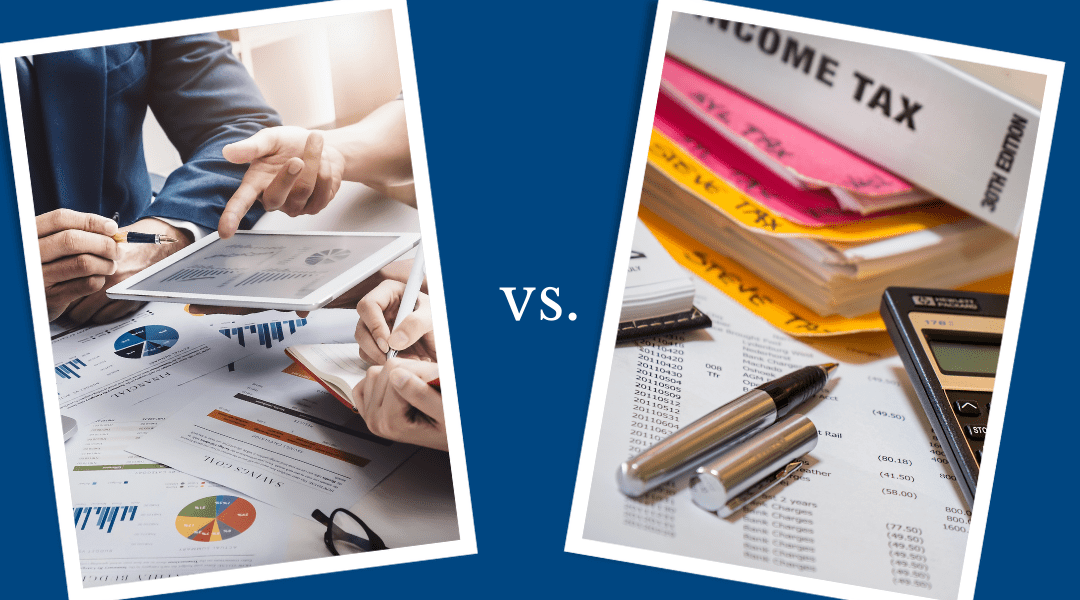The two most essential pieces to any financial team are a financial advisor and a tax accountant. If you’re lucky, your financial advisor may have a tax accountant they work with in-house. If not, it may be up to you to find your own.
Deciding who you work with is an essential part of financial success. People do not typically stumble upon financial success, but finding the right team of financial professionals can maximize your chances of financial success.
The financial services world is vast, including money management, insurance, taxes, and more. There are many experienced professionals for all areas of the industry, but unfortunately, they are not always interchangeable when it comes to their area of expertise.
So, how do you know which professional you need?
Financial Advisor vs. Accountant
Many experienced financial professionals and accountants are available, and each one may have a different skill set that better suits your needs. By looking at your financial professional or accountant’s licensing, credentials, and focus, you can better understand the services they can provide.
Accountants provide tax counsel on your annual or estate tax returns. A business accountant may provide additional services such as auditing. However, they are typically able to find ways to ease your tax burden. Many accounts may recommend opening a retirement account and contributing to alleviate your tax burden; however, they are not licensed to open these accounts for you, which would require a financial professional.
Financial Advisors provide investment advice; others are going to create comprehensive financial and wealth management plans. These advisors can provide a range of services from risk management to estate planning and retirement income strategies. However, with all of these services and financial plans comes new tax laws and implications. Partnering with both a financial advisor and an accountant can help you manage your finances and taxes efficiently.
The relationship between a client and a Financial Advisor or accountant is also very different. Nin Mitchell from The Colony Group compares the relationships to that of a general and subcontractor. The general contractor, the Financial Advisor, creates and sees the larger plan. They interact with their clients frequently, getting to know them personally and professionally to understand their financial needs best. The subcontractor, the accountant, is usually brought in for a specialized task one or more times over the entire plan. This tends to create more of a transactional relationship between accountant and client. However, many people do have long-term relationships with their CPAs.
In regards to credentials, there are many designations a financial advisor or accountant can obtain. One of the highest accreditations a financial advisor can obtain is the CFP or Certified Financial Planner. Similarly, one of the highest accreditations an accountant can receive is a CPA or Certified Public Accountant. These titles have additional education, examinations, and licensing requirements to become a CFP or CPA. You may see other designations attached to these professionals that relate to their area of expertise.
Should I hire a financial advisor or an accountant?
Whether to use a Financial Advisor or an accountant comes down to a straightforward question: What are your goals?
By defining your goals, you can identify any problems that may arise down the road. Based on these problems, you can decide who is better suited to aid in your situation. If you need an annual income tax return filed, an accountant would be your best choice. New legislation that affects tax laws and regulations is constantly changing. A new President always brings new tax laws, and with the COVID-19 pandemic last year, there was new legislation passed regarding taxes that you may not be aware of. To be sure you are maximizing your deductions, an accountant is your best choice due to their knowledge of tax law and IRS rules and regulations.
However, if you’re looking for more financial help than just taxes, you may want to consider a Financial Advisor. From opening a retirement savings account to comprehensive financial plans, Financial Advisors can offer more comprehensive financial advice. There is much at stake when it comes to investing, and risking money in the stock market can be a daunting challenge for your average adult. Enlisting a Financial Advisor’s help gives you not only professional advice, but a shoulder to lean on when the path gets bumpy. The market will always experience highs and lows. When you have a personal stake in the game (your invested money), it is easy to forget about the bigger picture and worry about the situation right in front of you. A Financial Advisor can provide you with well-informed, professional advice not based on emotion that may make you more comfortable waiting out the market’s short-term turbulence to reach your long-term goals.
If you are considering hiring a Financial Advisor, reach out to a team member today to see how we can help you reach your goals and maximize your wealth!

